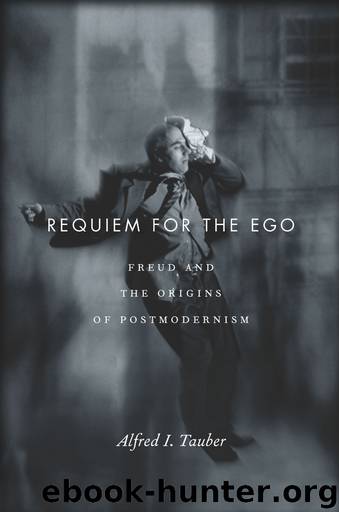Requiem for the Ego: Freud and the Origins of Postmodernism by Alfred Tauber

Author:Alfred Tauber [Tauber, Alfred I.]
Language: eng
Format: epub
Publisher: Stanford University Press
Published: 2013-05-26T16:00:00+00:00
7
Wittgenstein and the Quandary of Private Language
Do not try to analyze your own inner experience.
—LUDWIG WITTGENSTEIN, Philosophical Investigations
Freud offered a new genre of autobiography, one based on an inquiring agent. Most generally, a strategy of narration structures the psychoanalytic encounter with the past, and in that retelling, identity shifts (Tauber 2010, pp. 197–204). The ignorant becomes enlightened; the oppressed, liberated; the neurotic, healthier, and so on. Stories find their legitimacy in a complex exchange between the narrator and the reality in which the story is placed. In fiction, the author establishes the context; in autobiography, the facts of one’s life find their place within the personal domain of a specified social reality in which relationships were enacted and behaviors performed. Each of the critics so far discussed places an agent at the center of his respective delineation of the subject, whether identified as an excessive subject, Dasein, or the schizophrenic. But how would such subjectivity appear if the metaphysics of selfhood abandoned the ego, if the I had no referent?
We have traced the evolution of post-Freudian subject-object thinking and in the process studied the reformulation of the ego in various degrees of its deconstruction. Now we consider why Wittgenstein, referring to the self as “deeply mysterious” (1979, p. 80e), presented the most radical understanding of agency based upon a critique of language and predicate thinking.1 And in the context of how we might better understand the psychoanalytic project, Wittgenstein’s attempts to dismantle the hold of representational depictions of the mind and thus unsettle Freud’s project at its very foundations complete our survey of those who would reconfigure the ego and thereby radically change our understanding of subjectivity.
Wittgenstein’s philosophy of psychology reduces to a philosophy of language. For him, asking how language captures reality is symptomatic of muddled metaphysics. Language is reality, and the assumed posture of a subject standing apart from the world and finding ways of relating to that world rest on a faulty subject-object structure of experience. So, in place of some correspondence that attempts to meld the subject-object divide, Wittgenstein, like Heidegger, would place the speaker in the world. His inquiry begins with the “innocent” wonder that thought functions smoothly as humans live in the world, but upon reflection, thinking beguiles and escapes explanation:
“This queer thing, thought”— . . . Thought does not strike us as mysterious while we are thinking, but only when we say, as it were retrospectively: “How is that possible?” How was it possible for thought to deal with the object itself? We feel as if by means of it we had caught reality in our net. (Wittgenstein 1968, § 428, p. 127)
Of course, he goes to great pains to show that such confidence of capturing the real is misplaced. The real is already present, not hidden, obscured, or separate from human being. However, embedded in predicate thinking, the subject easily employs an epistemology about things and applies that same mental strategy to various other domains, including one’s own subjectivity. These are what Wittgenstein called errors of grammar.
Download
This site does not store any files on its server. We only index and link to content provided by other sites. Please contact the content providers to delete copyright contents if any and email us, we'll remove relevant links or contents immediately.
The remains of the day by Kazuo Ishiguro(7551)
Tools of Titans by Timothy Ferriss(6947)
The Black Swan by Nassim Nicholas Taleb(6192)
Inner Engineering: A Yogi's Guide to Joy by Sadhguru(5897)
Giovanni's Room by James Baldwin(5878)
The Way of Zen by Alan W. Watts(5800)
The Six Wives Of Henry VIII (WOMEN IN HISTORY) by Fraser Antonia(4791)
The Power of Now: A Guide to Spiritual Enlightenment by Eckhart Tolle(4755)
Astrophysics for People in a Hurry by Neil DeGrasse Tyson(4620)
Asking the Right Questions: A Guide to Critical Thinking by M. Neil Browne & Stuart M. Keeley(4576)
12 Rules for Life by Jordan B. Peterson(3734)
The Ethical Slut by Janet W. Hardy(3503)
Skin in the Game by Nassim Nicholas Taleb(3460)
Housekeeping by Marilynne Robinson(3401)
The Art of Happiness by The Dalai Lama(3384)
Double Down (Diary of a Wimpy Kid Book 11) by Jeff Kinney(3272)
Skin in the Game: Hidden Asymmetries in Daily Life by Nassim Nicholas Taleb(3264)
Walking by Henry David Thoreau(3234)
12 Rules for Life: An Antidote to Chaos by Jordan B. Peterson(3203)
